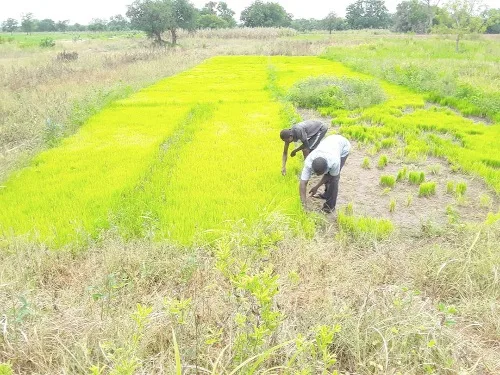Rice farmers within the Tono Irrigation Scheme in the Kassena-Nankana Municipal of the Upper East region have expressed dissatisfaction with the low prices offered for their produce amid an oversupply of rice.
The farmers argue that the absence of readily available buyers has allowed middlemen to take advantage of the situation. As a result, these middlemen are purchasing a 220-kilogram bag of rice at GH¢700, a significant decline from the GH¢900 received for a 180-kilogram bag last year.
A farmer and Chairman of the Federation of Water Users Association, Robert Kwame Abokah, who spoke to Citi News said, “We have harvested about 30 percent, and by next week, we will be at the peak level. But if you look at the market, the price is going down due to the lack of buyers.”
Mr. Abokah stated that farmers in the region incurred production costs of GH¢8,500 to cultivate at least 10 bags of 180 kilograms of rice during the last farming season when the selling price per bag was GH¢900.
“As the buyers are giving us GH¢700 for the 180-kilogram bag, and the cost of production of 10 bags is 8,500 cedis for 1 acre, what it means is that the farmer will get only GH¢7,000. And that will be a loss of GH¢1,500,” Mr. Abokah lamented.
The substantial decrease in the price per kilogram is creating financial challenges for the farmers, placing them under economic pressure due to the diminished returns on their labor.
Doris Adda, a female farmer, voiced her frustration, noting that the government’s efforts to involve more women in agriculture are hindered by the actions of the middlemen.
“As the government is urging women and youth to go into farming, we have produced quality rice that will help the women pay their children’s school fees. But now, we are battling for a ready market to enable us to pay our children’s school fees…So, we are begging the government and stakeholders to come in and save us to sell our rice.”
Harry Kubaje, another farmer, has appealed to the government, particularly through the Ghana Standards Authority (GSA), to provide support by introducing a standardized type of bag.
“We used to have a standard sack that we continued till date. But the open market buyers have customized their sacks, further enlarging the sacks, taking more from us, and giving us less. And so, we urge the Ghana Standards Authority to come in and help us.”

